Matching skills Normal Worksheets for Ages 4-5
12 filtered results
-
From - To
Enhance your child's learning experience with our Matching Skills Normal Worksheets designed specifically for ages 4-5. These engaging and interactive worksheets provide fun exercises that promote cognitive development and critical thinking. Children will explore vibrant illustrations, helping them recognize similarities and differences while developing essential matching skills. Each activity is tailored to grow their understanding of colors, shapes, and objects, ensuring they build a strong foundation for future learning. Ideal for both classroom and home use, these worksheets make learning enjoyable and effective. Unlock your child's potential with our expertly crafted matching skills worksheets today!


Fruits Match Up Worksheet


Word Matching Game Worksheet


Matching: Matching Pairs Worksheet


Food Match Up Worksheet


Find Uppercase Letters D, E, and F Worksheet


Matching Shapes Worksheet


Different Kinds of Weather: Windy and Snowy Worksheet


Count and Match Points 7 Math Worksheet


City Workers: Matching Worksheet


Five Senses Printable


Matching Numbers to Amounts Worksheet
Matching skills are fundamental for children aged 4-5 as they lay the groundwork for critical cognitive and social development. During this stage, children begin to make connections between objects, ideas, and words, which are essential for their overall learning experience. By engaging in matching activities, children enhance their memory and concentration abilities. They learn to recognize patterns and categorize information, which fosters logical thinking—a key component of problem-solving skills.
Moreover, matching skills support language development. As children match objects with names or images, they expand their vocabulary and improve their understanding of the world around them. This activity also promotes visual discrimination, where they fine-tune their ability to notice similarities and differences in shapes, colors, and sizes.
Additionally, matching activities can facilitate social interaction. Collaborative matching games teach children how to take turns, share ideas, and communicate effectively with peers. This forms a foundation for positive relationships and teamwork.
For parents and teachers, nurturing these skills is important not just for immediate learning benefits but also for long-term educational success. As they prepare children for more complex tasks, they help instill confidence and a love for learning, establishing pathways for lifelong engagement in academics and social interactions.
 Assign to My Students
Assign to My Students















